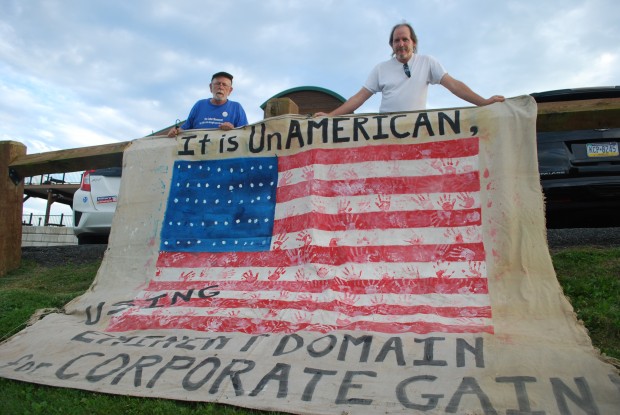PennEast critics accuse FERC of trying to control public comment

Jon Hurdle / StateImpact PA
Roy Christman (left) and William Kellner outside a FERC meeting on the proposed PennEast pipeline where they displayed a banner objecting to the possible use of eminent domain by pipeline companies to enable construction on private land.
This story has been updated to change some meeting locations, reflecting updated information from FERC.
Opponents of a plan to build a natural gas pipeline from northeastern Pennsylvania to central New Jersey registered their objections with federal regulators on Monday, and accused officials of trying to control public discussion on the controversial project. Participants were not allowed to hear each other’s testimony, nor were reporters granted access.
Nevertheless, around 50 people expressed their views on a draft Environmental Impact Statement (EIS) for the proposed PennEast pipeline, published by the Federal Energy Regulatory Commission in July.
Testimonies, lasting three to five minutes each, were delivered one-on-one to FERC officials sitting behind a line of black curtains at Penn’s Peak, a concert venue outside the town of Jim Thorpe, PA, near the pipeline route. A stenographer recorded the remarks but the officials did not respond to people’s comments, participants said.
Mark Zakutansky, mid-Atlantic policy manager for the Appalachian Mountain Club, said the meeting’s format deprived participants of the right to hear each others’ views, which they would have had in a traditional public meeting.
“These meetings have traditionally taken place in a more public format where people can hear other citizen comments,” Zakutansky said. “The more private nature of this meeting is not exactly what we had in mind; we feel the public has a right to hear each other’s testimony.”
But Alisa Lykens, chief of FERC’s Gas Branch 2, denied there was any attempt by the agency to limit public comment or control public opposition to the 119-mile pipeline.
“Not at all,” Lykens said. “We came out with this format to be able to hear as many people as possible.”
She said that previous meetings to discuss the scope of the PennEast project had drawn about 300 people, and that all of their views could not be heard in the time available, so the agency had opted for the one-on-one format this time.
“This was a way to get everyone’s comments heard over the course of the evening,” she said.
Asked to characterize the comments during the evening, Lykens said that some participants had expressed concern that the pipeline would damage the environment, and that others had spoken against the company’s possible use of eminent domain to build the pipeline on private land if owners refuse its offers of compensation.
She said some had spoken from prepared testimony; others from notes, and others without any prepared comments. Reporters and other individuals were not permitted to attend the testimonies.
After making their statements, some participants attacked the EIS conclusion that the project would not have significant environmental impacts provided that the builder, PennEast Pipeline Co., implemented measures to offset impacts such as soil erosion.
“This is the most flawed environmental impact statement that I have ever seen,” said Dan Kunkle, executive director of the Lehigh Gap Nature Center, an environmental group whose focus includes Carbon, Lehigh and Northampton Counties where the pipeline would be built. “It doesn’t address any of the concerns that we presented before they drafted this EIS.
“You can’t build a pipeline like this across all these streams and through all these forests without an ecological impact,” Kunkle said, after giving his testimony.
Opponents say the project, like others currently planned in Pennsylvania, threatens public safety and environmental quality, and would carry gas that is destined for export rather than domestic consumption.
Pat Kornick, a spokeswoman for PennEast, said around half a dozen pipeline supporters attended the meeting.
Kornick rejected critics’ arguments that the pipeline is not needed because of ample gas supplies from other sources in both states.
She said some 50 percent of Pennsylvania households and 80 percent of those in New Jersey rely on natural gas for home heating alone, and that the fuel, which emits less carbon than coal when burned, is increasingly used by utilities for electricity generation.
“The local utilities recognize the need for an affordable and locally produced source of natural gas that will deliver cost savings and alleviate system constraints to best serve families and businesses,” she said.
Roy Christman, who owns 23 acres in nearby Towamensing Township where the pipeline would be built, said he had rejected an offer of compensation from PennEast, and is preparing for a legal battle over the pipeline.
“We are not negotiating,” said Christman, 73. “They are going to have to take us to court.”
In his testimony, Christman accused FERC of being biased in favor of energy companies, and that it was therefore likely to approve pipeline applications like PennEast.
“Given the past record of pipeline approvals, the daily contact with representatives of energy producers, and the method by which the agency is funded, many observers assume FERC is biased in favor of the energy companies who come to it for approval,” Christman’s written testimony said.
The meeting, and another in Bethlehem on Monday evening, were the first of four to be held by FERC in Pennsylvania ahead of a Sept. 5 deadline for receipt of public comments on the EIS. A FERC spokesperson mistakenly told StateImpact that there was no meeting scheduled Monday night in Bethlehem. FERC says meetings will also take place Tuesday night in Clinton, New Jersey, and Lahaska, Pennsylvania. Meetings are also taking place Wednesday night in Wilkes Barre, Pennsylvania and Trenton, New Jersey. The agency is expected to finalize the EIS by December.
















